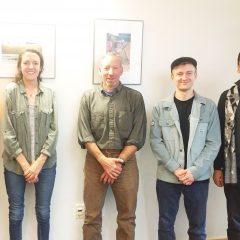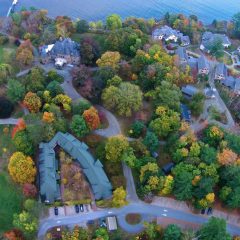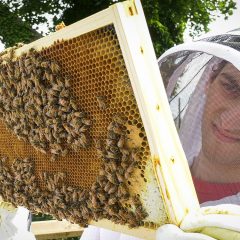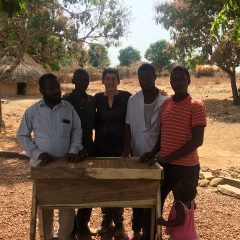EcoLeague member College of the Atlantic participates in “Mapping Ocean Stories,” a community-engaged science project to grow resilience against climate change
Mapping Ocean Stories, a long-term, community-engaged science project to grow resilience against climate change along Maine’s working waterfront, has received $200,000 in grant funding from the Maine Community Foundation. The project engages multiple College of the Atlantic faculty members, students, and community stakeholders.
The project, entitled Mapping Ocean Stories (MOS), utilizes the work of students, staff, faculty, fishermen, and other community members along with connections to partner organizations to build a useful resource that coalesces complex and nuanced information gathered from interviews with local stakeholders. Project organizers, including computer science professor Laurie Baker, history professor Todd Little-Siebold, COA coastal community engagement program lead and researcher Galen Koch of Maine Sound + Story, and Natalie Springuel ’91 of Maine Sea Grant, intend to make the collection accessible to policy makers and community leaders facing critical decisions around shifting ocean resources due to climate change.
For more details: https://www.coa.edu/live/news/2022-project-supports-climate-change-resilience
EcoLeague member Dickinson Joins Large-Scale Solar Project, Supporting Commitment to Sustainability
Dickinson and eight other colleges and universities in North Carolina and Pennsylvania are joining forces to bring an innovative, large-scale solar facility online in western Kentucky. By collaborating on this Power Purchase Agreement (PPA), Davidson College, Dickinson College, Elon University, Haverford College, Lafayette College, Lehigh University, Muhlenberg College, Swarthmore College and Wake Forest University are accessing the benefits of renewable energy through a deal typically only feasible for large customers.
“It’s really exciting to be a part of this project,” says Ken Shultes ’89, associate vice president for sustainability and facilities planning at Dickinson. “When combining this project with our 3-megawatt (MW) Solar Field, we are mitigating 100% of our Scope 2 carbon emissions.”
Guided by Coho, an ERM Group Company, the institutions are working with NextEra Energy Resources, the world’s largest generator of renewable energy from the wind and sun, and a world leader in battery energy storage. The consortium is supporting the Sebree Solar II project through a PPA that entails purchasing energy for 20 years. The Sebree Solar II project is set to begin construction in early 2025 and commence commercial operation by the end of 2026. The solar site is projected to provide enough energy to annually power more than 24,000 homes when complete.
The solar facility will be located near the town of Robards, Kentucky, near the Ohio River. The Sebree Solar II project will offer considerable environmental benefits as the project will generate up to 150 MW of clean, renewable energy. Over its 30-year lifespan, the solar site will contribute approximately $12 million in additional tax revenue to Henderson County which can be used for roads, schools and other public services.
While electricity generated by the Sebree Solar II project cannot be transmitted directly to the consortium campuses because of distance, the benefits of investing in new additional renewable energy will still be transferred to the schools. Dickinson will be paying for an amount of energy equal to approximately 75% percent of the electricity used by its campus, with the remainder being satisfied by the college’s 3 MW Solar Field. In exchange, Dickinson will receive renewable energy credits, which can be used to account for greenhouse gas emissions related to purchased electricity.
Notably, Dickinson was one of the first 10 colleges in the country to achieve neutrality. Moving forward, its focus is on reducing reliance on offsets, and more generally to continue to introduce operational sustainability initiatives as learning opportunities for students. Dickinson will receive access to data from the Sebree Solar II project for classroom use, as well as campus speaking engagements, site visits and student internships.
“We are pleased to work with Dickinson and the other institutions to help them achieve their sustainability goals,” said Anthony Pedroni, vice president, renewable development and M&A NextEra Energy Resources. “This solar energy project will generate homegrown energy and provide millions of dollars in additional tax revenue to Henderson County over the life of the project.”
Reposted from https://www.dickinson.edu/news/article/5756/
Worldwide Climate and Justice Education Week, APRIL 1-8, 2024
From EcoLeague consortium member Dickinson College:
Join with fellow Dickinsonians to educate yourself about climate change during Make Climate a Class @ Dickinson, April 1 – 8. Make Climate a Class @ Dickinson is part of the Worldwide Climate and Justice Education Week, an event that will engage thousands of students worldwide in a focused week of learning at scores of colleges, universities, and k-12 schools in 50+ countries.
During the period April 1 through 8, ten Dickinson faculty members are making climate change a focus of one of their classes and several are opening their climate-focused class to visitors. Participating courses include Arctic studies, physics of global warming and renewable energies, health studies, American environmental history, African government and politics, the Middle East since 1750, and gastronomy and health in the Basque country.
For the schedule of classes, visit https://www.dickinson.edu/info/20052/sustainability/4488/make_climate_a_class
Please register (https://docs.google.com/forms/d/e/1FAIpQLSc-tAN_z8F-cbhjDq01jze7Ywk7pVGCswIgoJimVGx_7XFpTA/viewform) in advance for any classes that you want to visit.
EcoLeague member, Dickinson College, to Host Campus and Community Workshop on Climate Resilience
Event Aims To Foster Collaboration And Discussion On Climate Risks, Resilience Strategies And Actionable Priorities
Dickinson will host an interactive event on climate risks and responses in Cumberland County. The Campus & Community Workshop on Climate Resilience will take place Friday, Dec. 15, from 2-5 p.m. in the Allison Hall Community Room. It is free and open to the public. All participants will be entered into a drawing for door prizes, and snacks and beverages will be served. The registration deadline is Dec. 12, when all participants will receive an email with the program and additional information. Registration can be completed online.
The collaborative workshop, led by students in the Baird Sustainability Fellows program, aims to foster collaboration and discussion on climate risks, resilience strategies and actionable priorities in the region. In the face of escalating climate challenges, the workshop provides a platform for residents, businesses and other stakeholders to collectively address the impact of severe weather on health, the economy, infrastructure, agriculture and the environment. By incorporating community input, the event seeks to develop thoughtful plans that mitigate risks and build resilience.
Dickinson is a noted leader in sustainability. For the second year in a row, Dickinson has earned the top position among baccalaureate institutions in the prestigious Sustainable Campus Index, a publication of the Association for the Advancement of Sustainability in Higher Education (AASHE). Newsweek recently named Dickinson one among “Seven of the Greenest College Campuses in the U.S.” The Princeton Review ranked the college fifth in the nation on its list of “Top 50 Green Colleges” and named the institution to its annual “Green Honor Roll.” Other sustainability achievements include being one of the first 10 colleges in the U.S. to reach carbon neutrality and joining the Second Nature Climate Leadership Resilience Commitment.
Originally published by Dickinson College. Written by Craig Layne.
Students at Dickinson College, EcoLeague member, Witness Innovation at Work at COP28
STUDENTS TRAVEL TO DUBAI THROUGH GLOBAL-ED PARTNERSHIP
Determination surged through the first days of the United Nations’ 28th annual Conference of the Parties (COP). And two Dickinson students were there in Dubai to see the wheels of progress in motion.
The COP draws together some of the world’s leading decisionmakers, scientists, activists, government officials and thought leaders to discuss pressing challenges posed by climate change and consider next steps. With funding through a grant awarded by the Stevens Institute and in partnership with the American University of Sharjah (AUS), Dickinson sent Heather Johnson ’25 (environmental studies, political science) and Georgia Mugisha ’26 (international studies, economics) to Dubai to attend the opening days of COP28.
“This experience provided real-world connections and applications of our work to demonstrate the interdependence of sustainability and global education and provided a platform for our students to experience the challenges and solutions surrounding the global climate crisis,” says Lindsey Lyons, Dickinson’s director of sustainability learning. “Students could apply their Dickinson education to addressing some of the world’s most pressing needs while exploring the culture of Dubai, campus life at AUS and global partnerships focused on sustainable solutions.”
Johnson and Mugisha were selected through an application process that centered on interviews with faculty. Once in Dubai, they resided at the local university as part of a U.S. student cohort.
The cohort took part in two full days of COP sessions, exploring sites and attending talks. They observed as member nations promised to provide aid to poor countries struggling with the effects of a warming planet and pledged to dramatically cut methane production in the months and years to come. “It meant a lot to me to get to see firsthand all the super creative and innovative efforts of so many different nations and individuals,” says Mugisha.
The students also explored their host country’s culture. They learned about traditional Emirati life during a tour of Dubai’s oldest neighborhood and sampled regional street food at a bustling marketplace. During their final evening they visited the famed Dubai Mall and dined under the bright lights of the Burj Khalifa skyscraper.
“I learned that nothing beats real life experiences and getting to see the real implications of what I’ve been studying,” says Mugisha, who’s taking two courses this semester with major sustainability components—one of which includes close study of UN Sustainable Development Goals. “My understanding of climate change and exposure to what’s being done about it around the world has also grown so much.”
The opportunity was also a perfect fit for Johnson, who’s focusing on the Middle East, the energy transition, GIS and American foreign policy in her classes this fall. She even was able to meet American University of Sharjah students who’d partnered with her GIS class on a project.
“I learned so much about UAE culture and history, but mainly, I learned that there are so many people who are fighting the same fight I am,” says Johnson, who marked her first overseas trip at the COP. “It was comforting to see how many people truly care about the environment and justice and are figuring out a way that we can reach environmental goals.”
Originally posted by Dickinson College under the title: Catalyst for Change: Students Witness Innovation at Work at COP28.
EcoLeague member, Prescott College, co-hosts “Climate Talks for Everyone” speaker series.
The “Climate Talks for Everyone” speaker series is co-sponsored with Fridays for Future USA, Prescott College, the Northern Arizona Climate Change Alliance, Elders Climate Action, and many other groups. Please join in these exciting zoom talks with climate activists fully engaged in the climate movement. They are on zoom with the link supplied after you RSVP.
The next talk: Climate Refugees and Arizona’s Future
Presenter: Prof. Stefan Sommer, NAZCCA Activist, NAZCCA Board
Saturday, 16 December, 2 PM Arizona Time, 2 pm CT, 4 PM ET, 12 pm AKST
Prior and future talks can be reviewed at this link.
EcoLeague Expands Networks as Faculty Share Research Initiatives
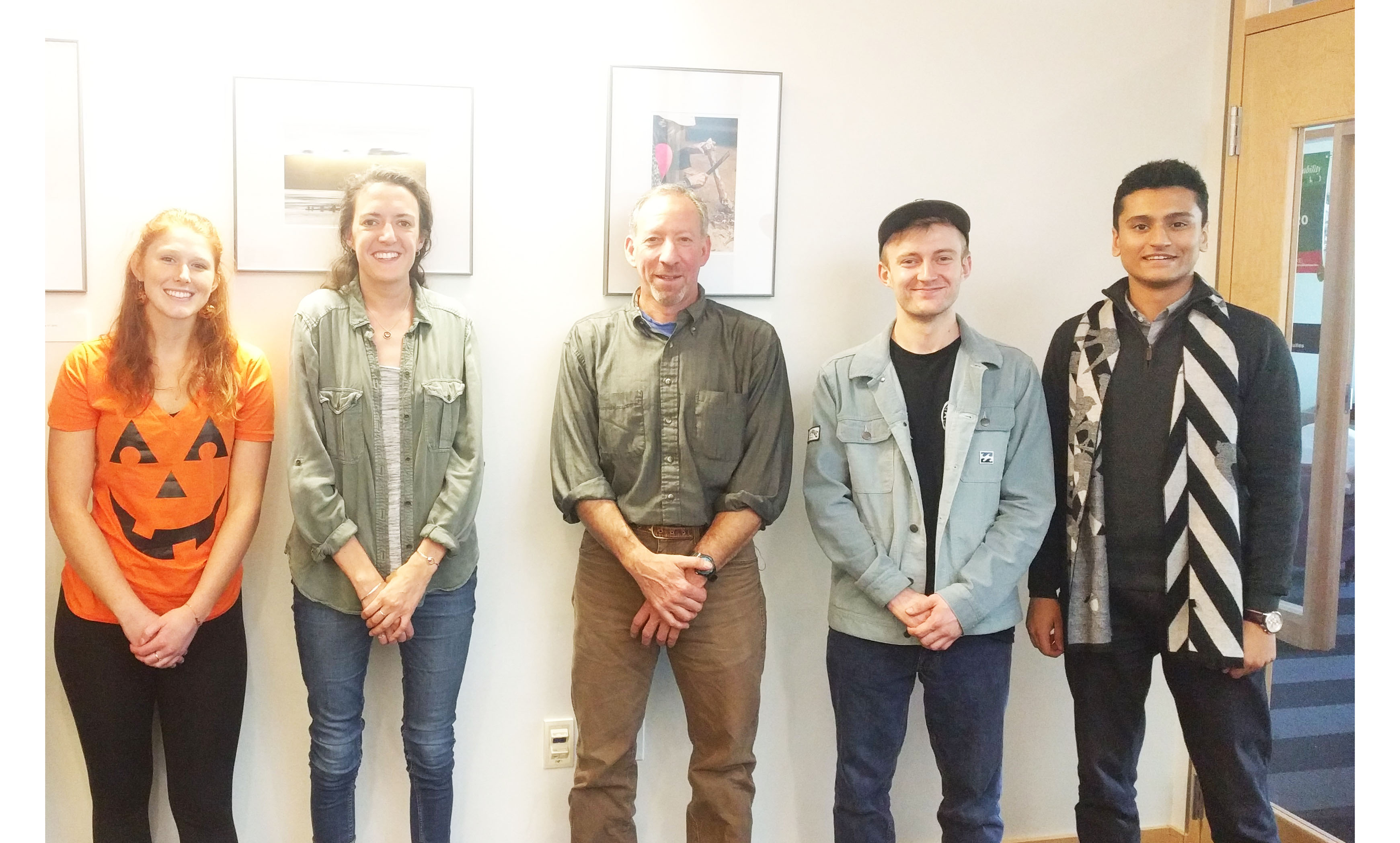
Between annual EcoLeague summer retreats and faculty information sessions, EcoLeague community members are becoming increasingly well versed in each other’s programs, which rest at the forefront of sustainability studies and environmental and agricultural best practices. Perhaps less well-known,
until recently, are some of the local research resources for social scientists like the archives of the Carlisle Indian Industrial School, situated less than two miles from the Dickinson College campus in central Pennsylvania. Recent efforts to increase faculty collaboration across the consortium have furthered the consortium’s goal of sharing resources, knowledge, and opportunities for both students and faculty. With the help of an Andrew W. Mellon research grant, Dickinson sociology professor Susan Rose has embarked on a multi-year project to digitize the Carlisle Indian School’s vast archives and to share these resources with the public. Likewise, Alaska Pacific University professor of outdoor education, Steve Rubinstein, traveled to Dickinson College in Carlisle, PA, to exchange ideas with faculty in environmental studies and education.
Founded in 1879 as part of the United States government’s efforts to assimilate Native American youth populations into American culture, the Carlisle Indian School raises complex questions about American imperial “civilizing” projects and attempts to mollify indigenous populations. The site, currently managed by the United States Army War College, also houses controversial burial grounds for Native Americans who attended the school. Of interest to anthropologists, historians, sociologists, archaeologists, and scholars of indigenous studies, the archives of the Carlisle Indian School indeed prove fertile research ground in both figurative and literal terms.
Accompanied by Dickinson College archivist Jim Gerencser and Carlisle Indian Industrial School website creator Barbara Landis, Professor Rose travelled west in spring 2018 to meet with indigenous communities and disseminate information about the project with interested colleges and museums. The trip offered multiple opportunities for faculty collaboration and community engagement across the EcoLeague consortium, as Professor Rose’s group made visits with EcoLeague partners Northland College, in Ashland, Wisconsin and Prescott College, in Prescott Arizona, to coordinate with faculty and students. Rose teamed up with the program chair of Prescott’s Masters in Social Justice and Community Organizing, Ernesto Mireles, to bring Masters students in his course on indigenous communities and land rights to a film screening of The Lost Ones: The Long Journey Home, at the nearby Heard Museum in Phoenix.
“I was impressed with the people we met and the passion they had,” said Rose after meeting with Prescott students and faculty.
With help from Northland College Associate Professor of Natural Resources, Sarah Johnson, Rose’s team linked up with Assistant Professors of Native American Studies Emily Macgillivray and Kyle Bladow and their Indian Museum Studies course. Macgillivray and Bladow organized a ferry outing with their class to nearby Madeline Island Museum, with exhibits dedicated to Native American artists and women’s work, while two Northland students presented their own exhibit on the Carlisle Indian School. Before Rose and company left Ashland, WI, Northland helped organize a community meeting including members of local indigenous groups. We had a really productive visit,” Rose recounted. “These were some of the most engaged faculty we’ve seen, and it worked out great!”
The EcoLeague also supported APU professor Steve Rubinstein’s tour of the Dickinson campus where he shared expertise on environmental and outdoor education with Dickinson students and faculty in Fall 2018. Students learned about APU’s Master of Science in Outdoor and Environmental Education. Over the past 10 years, Rubinstein has been building the outdoor education program at the 800-acre farm donated by a trailblazer of women entrepreneurs in farming, Board of Trustee Louise Kellogg. Rubinstein has creatively used APU’s Kellogg campus in Palmer, AK as a canvas on which to “paint sustainability.” Efforts include curricular design for place-based environmental education that integrates community elders and targets Alaska’s relatively high population of home-schooled students who supplement home study with outdoor learning led by APU’s student teachers at APU’s Kellogg Field School.
Rubinstein also toured the Dickinson College Farm with farm director Matt Steiman to compare techniques across bio-regions and met with student interns from the farm and Dickinson’s Center for Sustainability Education. Students learned about Alaska’s specific challenges to develop heat-efficient and environmentally sustainable homes and structures, as well as the need for self-contained water systems for coastal villages that may need to relocate in future due to climate change. Sharing a breadth of knowledge about careers in outdoor education, environmental studies and sustainable living, Rubinstein advised students to “get a lot of diversity of experience […] and to be able to articulate it well for whoever you want to work for.”
Plans for expanding EcoLeague networks even further are already in the works, as Rose is targeting a summer 2020 trip to Alaska Pacific University. The Carlisle-based group has discovered that over 130 Indian young people from Alaska attended the Carlisle Indian School. Rose is looking to team up with APU faculty and students, and meet with Alaskan indigenous communities about their archival work.
Setting the Bar: EcoLeague Institutions Receive Top Ratings in Green Education
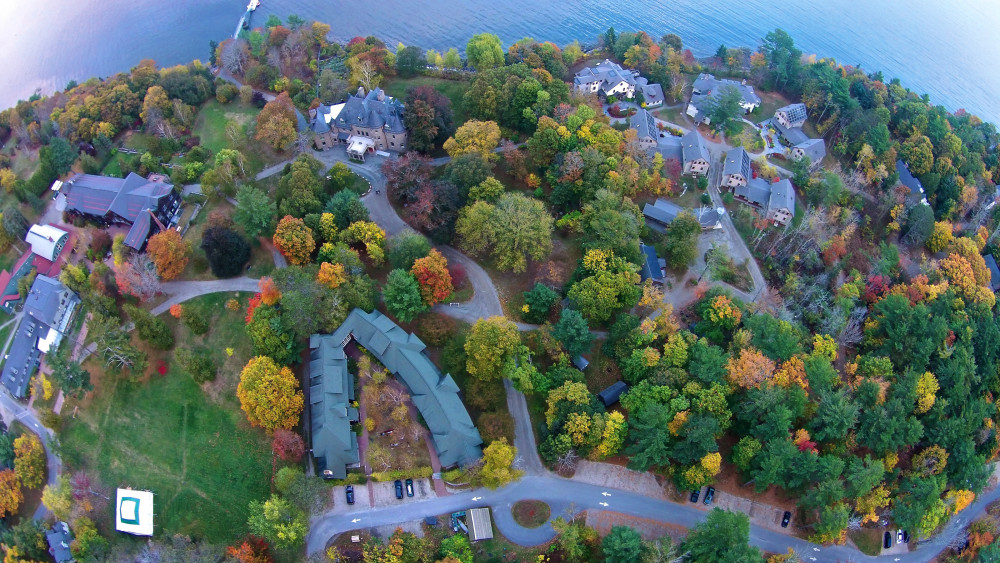
With decades of experience in environmental stewardship and sustainability studies, the EcoLeague consortium continues to be a leading innovator in green education. A host of sustainability initiatives at Northland College have placed it on Sierra Magazine’s List of Cool Schools, joining EcoLeague partners and perennial staples atop the rankings, College of the Atlantic (#1 in ’17 and ‘16) and Dickinson College (#6 in ’18, #25 in ’17).
From sustainable food practices and sustainability across curricula to eco-friendly housing, EcoLeague campuses create a holistic educational environment for students, and provide the tools to forge a sustainable future. It is no surprise then, that continued efforts of EcoLeague members to improve curricula and energy consumption were also recognized by the Association for the Advancement of Sustainability in Higher Education (full 2018 rankings here).
While Dickinson College claimed the top spot overall in sustainability for Baccalaureate institutions, Northland College came in at #8. All three aforementioned EcoLeague members were rated in the top ten for curriculum, with College of the Atlantic (CoA) was among the highest rated institutions for campus grounds.
Recent innovations in sustainability at EcoLeague institutions include:
College of the Atlantic
-Approved a comprehensive Discarded Resource and Material Management Policy, a student initiative to achieve 90% diversion of discarded materials campus-wide by 2025.
-At least 75% of COA’s faculty is engaged in sustainability research. More than 35% of the classes offered are related to the environment, sustainability, and social justice.
–Divested from fossil fuels as early as 2013.
-The first college in the U.S. to focus on the relationship between humans and the environment, where each student develops their own course of study in human ecology.
-Created the Community Energy Center to focus on renewable energy efforts in the surrounding community, including the Solar for Businesses and Farms program.
“I believe strongly that being innovative isn’t about chasing ‘the next greatest’ idea, but on focusing our innovations around what we do best and have been doing for nearly five decades—interdisciplinary, experiential education focused on addressing our planet’s most pernicious social and environmental issues,” said COA President Dr. Darron Collins ’92.
Dickinson College
-Completed a new 12,456 panel solar array to help meet Dickinson’s 2020 goal of carbon neutrality.
-New Residence Hall designed to enhance the student residential experience and meet Leadership in Energy and Environmental Design (LEED) Platinum for Homes standards.
-Launched an online Sustainability Dashboard to track energy use on campus.
-Composted 127 tons of food waste in 2017-18 and diverted 51% of their total waste.
-94% of students in the Class of ‘18 took a sustainability course without requirement. A sustainability course is now part of the requirements for a degree at Dickinson.
“Sustainability is part of the academic and co-curricular experience of every Dickinson student,” said Neil Leary, director of the Center for Sustainability Education. “It is also a guiding principle for campus strategic planning and operations.”
Northland College
-More than 80 percent of faculty incorporate sustainability into the classroom
-Composted 96,000 pounds of food waste for 2017/18 school year.
-Spent 46 percent of budget on local foods (within 100 miles of campus).
–Voted to divest from fossil fuels.
-Northland College Student Association purchased 100, 200-watt solar sharesds at Xcel Solar Garden.
-Became Wisconsin’s first Bee Campus as a way to promote pollinators.
“Faculty, staff, and students live the College’s environmental mission every day,” said Scott Grinnell, director of sustainability initiatives at Northland College. “Thinking about how our actions will advance sustainability in all forms—food, water, energy, stewardship, development, diversity, and social justice.”
GMC’s Kara Kessler ’11 Graduates from EcoLeaguer to Sustainable Entrepreneur
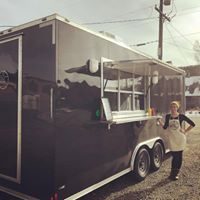
by EcoLeague Communications and Digital Media Assistant Claire Jeantheau, Dickinson ’21
Kara Kessler, a 2011 graduate of Green Mountain College, currently manages her own vegan food truck and holds a passionate interest in human relationships with the natural world. But discovering this path wouldn’t have been possible without her two-time exchanges through EcoLeague, marked by their experiential activities.
When she entered her first year at Green Mountain, Kessler was certain that she would study psychology—the high school class she found most interesting. After a “spontaneous” decision to go on an EcoLeague exchange in fall 2008 to Northland College, she learned the value of studying a broad mix of subjects.
“Green Mountain College had six hundred people at the time, so I decided that it’d be good to get out. And then I got [to Northland] and realized the importance of different areas of study, different professors,” Kessler recalled.
Kessler’s classes at Northland ranged from art and literature to adolescent psychology. However, it was a seminar on ecopsychology—a field examining relationships between humans and the natural world—that she found “the most intriguing, interesting, and defining”.
“I had a professor suggest ecopsychology,” Kessler explained, “and I had never heard of that, but it sounded very interesting. And so I studied ecopsychology… that’s when I realized I know what I want to do, I know what I want to learn more about.”
Having found her academic interest, she made the distinctive choice of completing a second EcoLeague exchange, this time at Prescott College in Fall 2010. By completing two exchanges, she was able to study ecopsychology in depth, particularly through her coursework at Prescott. Kessler credits EcoLeague with giving her the opportunity to discover a field that she wouldn’t have been able to explore at her home college.
“After my first EcoLeague experience, I realized … I can’t study [ecopsychology] at Green Mountain College, I’m going to pursue that individually, I’m going to research and tailor my degree to it.”
Because of EcoLeague’s experiential nature, many of Kessler’s favorite memories of her exchanges took place outside of the classroom. At Northland, she enjoyed studying near Wisconsin’s Lake Superior, a new environment from her home college in Colorado. There, she fondly remembers hiking in local wildlife and seeing the area’s aspens in the fall.
Later at Prescott, where she “got to take a lot of field trips,” she began her semester with a trip to Northern California to study sea psychology and marine biology for a month. The experience was made possible by Prescott’s unique schedule, which begins with an intensive three-week “Block” class before a typical pattern of semester classes.
Kessler now applies the interest in ecopsychology she cultivated in EcoLeague as the owner and operator of a vegan food truck. The Vegetable Express is based in Nederland, Colorado, and describes its goal on social media as “feeding your mind, body, and soul with plant-based foods.”
“On a different level, sustainably, I can heal the planet this way through plant-based eating, and I’m connecting to people and helping people psychologically through food. It’s been about how you relate to it, how you see it,” Kessler said, tying her EcoLeague studies to her current work. “[EcoLeague] definitely prepared me to do what I’m doing.”
If you are passing through Nederland, don’t forget to stop by Kessler’s Vegetable Express to support sustainability and, more importantly, to nurture the mind and body!
EcoLeague Alumni Profile: Travis Sherlin, Northland College ’15

Travis Sherlin graduated from Northland College in 2015, distinguishing himself by completing two EcoLeague exchanges, one at Prescott College (Spring 2014) and another at Dickinson College (Spring 2015). He currently works as an agroforester for the Peace Corps in Guinea, West Africa. We recently caught up with Travis to learn more about sustainable community development, developing his own class, and the impact EcoLeague had on his current work:
How did you get involved with EcoLeague?
As soon as I heard about EcoLeague, I knew I wanted to do it. How often do you get the chance to see more of the world without drastically changing your life plans? I was able to study exactly what I wanted, without having to navigate a precarious tuition cost switch, and see more of the beautiful US.
Why did you choose to study at Dickinson and Prescott?
I chose to study at Prescott because of a program that I had heard very high acclaim for—the social justice education block in Tucson with [Director of Prescott College Tucson] Anita Fernández. My plans were never to study education. Instead, I was interested in sustainable community development. Fortunately, I had the foresight to understand that socially just education looked very similar to socially just planning. Of all my education, that block has proven to be one of the most impactful, transformative, and enlightening. I’m very grateful for Dr. Fernández, her associates, and all their work. A huge bonus to that academically and emotionally rigorous course was the physically challenging rock climbing semester that preceded it. What luck to be able to work your academic and physical muscles in the same semester!
I chose Dickinson College, similarly, for its amazing course list and prestige. [Assistant Professor of Women’s, Gender, and Sexuality Studies] Katie Oliviero is a professor that challenged me like few others. Inside her course covering gender, migrations, and feminisms, every one of my conceptions on those three topics was challenged. Dr. Oliviero has a gentle but firm way of calling perceptions into question and pushing you to stretch your mind to own a fuller understanding of the course topics and the world around us. Her class was intimidating in the best way. I was pushed and I’m grateful for it. Too often, college students are graded on completing coursework regardless of whether learning occurred or not. Dr. Oliviero values academic growth as all professors ought to.
What kinds of academic work or research did you do while on exchange?
EcoLeague offered me the opportunity to create a class with a colleague of mine entitled “Advanced Readings in Urban Political Economy.” Through this course we were allowed to visit major cities around the northeastern US like New York City and Philadelphia, and in tandem with reading excellent scholarly works on city planning, evaluating and transcribing our perceptions and ideas of the cities we saw. This allowed us to take the years of readings and course work about city planning we had done and apply those ideas to our critiques of modern cities we visited. Brian Tochterman [Northland College Assistant Professor of Sustainable Community Development] did an excellent job of encouraging us to perceive and critique the world around us on a micro and macro scale.
What’s your favorite program memory from outside the classroom?
There were many wonderful memories that were made possible by EcoLeague. Rock climbing Moby Dick, a five pitch climb to a gorgeous vista and a 200 foot free repel at the Cochise Stronghold in Southern Arizona; real moments of incredibly difficult but life-changing epiphanies or revelations brought on by the help of fellow classmates; forging strong bonds with [Dickinson’s] local community of Carlisle by bartending at one of their finest Italian eateries, Trattoria Piatto; or working with groups that support undocumented students in the US. EcoLeague provided me with a plethora of truly incredible opportunities that I never would have had access to otherwise.
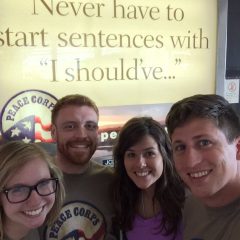
Have your EcoLeague experiences helped prepare you for your current work with the Peace Corps? How so? Any future plans?
I’m currently serving as an agroforester with the Peace Corps in Guinea, West Africa and I’m certain that Dr. Oliviero’s course gave me an educational prologue to understanding the very complex and tangled history of colonization, migrations, and milieu of places such as this. It has allowed me a very special perspective with which to view the modern history of Guinea. Likewise, a student of some excellent Community Development teachers like [Northland Associate Professor of Sustainable Community Development] Brandon Hofstedt and Brian Tochterman at Northland College, my position as a Peace Corps volunteer is not simple. I have a byzantine relationship with local development politics and have a whole new appreciation for international development work now that I’ve been working at the grassroots level for two years. I owe any success I’ve realized here to the whole of my education with emphasis on my EcoLeague experiences.
What advice do you have for students interested in EcoLeague?
Do it! It can break up monotony that sometimes accompanies academically rigorous schedules. It immediately inflates your course catalogue and options three or four-fold. Moreover, who doesn’t want to expand their geo-social perspective of the world and at the same time take incredible classes by incredible professors? It’s too good an opportunity to pass up.
Interview conducted by EcoLeague Communications and Digital Media Assistant Claire Jeantheau, Dickinson ’21
